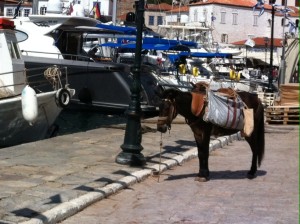We were not at all unhappy to leave behind Athens. A battered taxi down to the ancient port city of Piraeus, through depressing neighborhoods, and there we were, in the town Greek fleets have sailed from for more than 2,500 years.
While waiting for the ferry, we withstood the constant attentions of beggars and peddlers of cards or candy or other small items.
Where we were waiting apparently was considered the home territory of an aged woman, blind in one eye, who was selling small packets of facial tissues. She, at least, was offering a product for money, and we bought a packet. She never identified a price, so we gave her 40 euro cents, and she seemed fine with that.
Later, she twice berated a wretched beggar, one whose shtick was limited to sobbing loudly as he shuffled from one group of people to the next rattling a cup. The gist of her message seemed to be, “Get out of here; this is my territory, and you’re messing up things.” He tended to shuffle off after she tore into him.
Our boat showed up, a two-decker catamaran, and the crowd nearly filled it. A couple of hundred people, it seemed.
And once we settled in, and we began moving, we were on our way to Hydra, a two-hour ride that took us to a different sort of Greece.
It is easy to forget that many of the best-known parts of Greece are most easily reached by ferry. The country has something like 200 inhabited islands, from Crete and Lesbos and Rhodes to scads of smaller ones, like Hydra.
Hydra has been inhabited a long time, but it has never grown much beyond its current population of about 2,000 because it is pretty much a collection of rocky hills with very little vegetation — and one natural port.
As far as we can tell, all water is brought to the island from the outside world, and what little green we can see is right here in the city. The bare and brown hills that hem in the town remind me a bit of Avalon‘s setting, on the island of Catalina — except Catalina is far greener, and Catalina is 75 square miles, to Hydra’s 20 square miles.
Hydra, the city, hardly extends 400 yards from the water. That bit that is right on the port is lined with restaurants and shops, and little commercial boats dock right up against the pavement.
It remains fairly popular among Greeks escaping the sad hustle of Athens, but a significant body of visitors are foreigners, including nearly all of us who are here for a wedding.
We got a room in a place that was once the home of a former Russian army officer, and it is a curious collection of projects started and stopped, with stairways running here and there. It has a great view of the neighborhood, and the hills above the town.
The walk down to the busy strand is no more than five minutes through whitewashed homes, most of which seem well kept up.
Upon arrival at the ferry dock, at the north end of the city, we were met by porters and their mules who give visitors a ride for about 10 euros, and will carry your luggage to a hotel for about the same price.
(Not often you see mules working, in the Western world.)
The city has few, if any, four-wheel vehicles, and I’m not sure it has any motorcycles or scooters, either.
We had lunch on the strand, in a place that appears to be primarily an ice cream shop that grew a restaurant in front of it, and we liked it because it had comfy chairs, one-person sofas, really, and a close-up view of the harbor and the comings and goings of tourists to nearby beaches — the city proper having no beaches at all.
In the evening, we walked to the south edge of town and an outdoor bar there, where a reception was put on by those about to be married. We had a great view of the pleasure craft in the port, and the sunset, and the Greek mainland, and we had to be a little careful about straying too close to the edge of the tavern — because it led to a sharp drop onto jagged rocks.
We were still in Greece, of course, but Hydra — once the site of a Sophia Loren movie — seems to be in pretty good shape. Probably quiet and friendly in the winter, and busy and prosperous in the spring and summer.
It remains popular with Athenians keen to escape their decaying city and find some clean air, as well. Hydra enjoys a proximity to the Greek capital that most of the country’s numerous islands would love to have.
People here seem to be working hard, and making money — and the tourists seem willing to spend because the prices are not high, by Athens standards.
And Hydra, clean and efficient and friendly, is many of the things Athens is not.


0 responses so far ↓
There are no comments yet...Kick things off by filling out the form below.
Leave a Comment